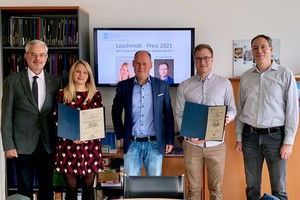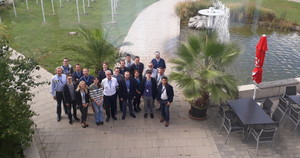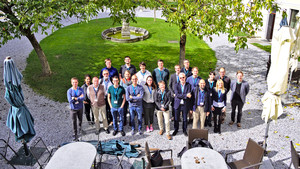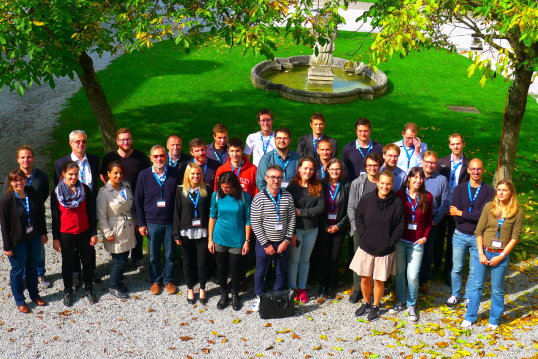Loschmidt prize 2021 for TU-D Dissertation!

We congratulate TU-D alumni Dr. Janine Schwestka (group of TU-D faculty member F. Aumayr) as well as Dr. Lukas Mennel (group of TU-D faculty member T. Müller) for receiving the Loschmidt Prize of the Austrian Chemical Physical Society Vienna 2021!
Retreat 2019
Our retreat 2019 took place in Langenlois.

Invited speakers;
- C. Stampfer, RWTH Aachen, Switzerland
- T. Greber, University of Zürich, Switzerland
- P. Singh, University of Oxford, UK
- P. Aspermayer, AIT, Austria
- J. Carrete, TU Wien, Austria
Retreat 2018
Retreat, 24-26 September 2018, Langenlois

Invited Speakers:
- P. Ruffieux, EMPA, Zürich
- M. Schleberger, Universität Duisburg-Essen
- P. Makk, Budapest University of Technology
- C. Teichert, Montanuniversität Leoben
Retreat in Langenlois
In September 2017, we had our first retreat in Langenlois, Lower Austria. One day of Soft Skill Training for our students managed by Masha Ibeshitz, and two scientific days. Many thanks to our invited speakers (T. Grasser (TU Wien), T. Ihn (ETH Zürich), J. Kotakoski (University of Vienna), M. Radovic (Paul Scherrer Institute), and L. Wirtz(University of Luxenbourg)).

Opening of the doctoral college
On Wednesday April 5th 2017, the TU-Wien funded doctoral colleges BIO-INTERFACES and TU-D was officially opened! The opening ceremony in the TU-the-sky lounge included a special guest talk by S. G. Louie, as well as brief presentations of the envisioned projects.

Introduction
Low dimensional materials exhibit a plethora of novel phenomena not found in their 3D counterparts: electronic and ionic correlation effects modify their macroscopic properties, making them an ideal scaffold for nanotechnology applications. Their reduced dimensionality yields a competition of bulk and surface effects, offering unrivaled tunability, yet challenging the limits of currently available experimental and theoretical tools. Because 2D systems lie at the crossroads of solid state physics, molecular chemistry, and materials science, the future leaders in nanotechnology require an expertise that transcends the traditional borders between disciplines. To fully harness the potential of these materials requires us to train a new generation of researchers. In TU-D we aim to create a new, research-driven PhD student education program on low dimensional materials, covering the four key areas of nanotechnology: synthesis & materials design, experiment & characterization, theory & modeling, and application potential & prototypes.
Unravelling advanced properties of two-dimensional materials (TU-D)
The mission of TU-D is educating the next generation of leaders in the field of 2D materials in the future state of the art. This will be achieved through a comprehensive PhD program built on collaborative research between the existing world-class expertise available at the TUwien.

The transition from bulk to low-dimensional materials (LDMs)
constitutes a paradigm change in materials research. In low dimensions,
materials exhibit exotic electronic and optical properties, due to
strong electron confinement and correlation effects. Their large
surface-to-volume ratio offers new opportunities for modification,
making them intrinsically more tunable than bulk materials. They are
perfectly suited for applications in electronic and optical devices,
energy storage, and catalysis.
With their reduced dimensionality,
LDMs stand at the crossroad between solid state physics, chemistry of
low dimensional molecular structures and materials science. In TU-D, we
bring together a team of world-class scientists and create a coordinated
research program focused on the 4 pillars of nanotechnology: E1
Synthesis and materials design, E2 Experiment and characterization, E3
Theory and simulation, and E4 Application potential and prototypes. This
sets the stage for a doctoral college to develop technology for people,
built on scientific excellence, where students receive a comprehensive
education on all aspects of LDMs from leaders in the field.


